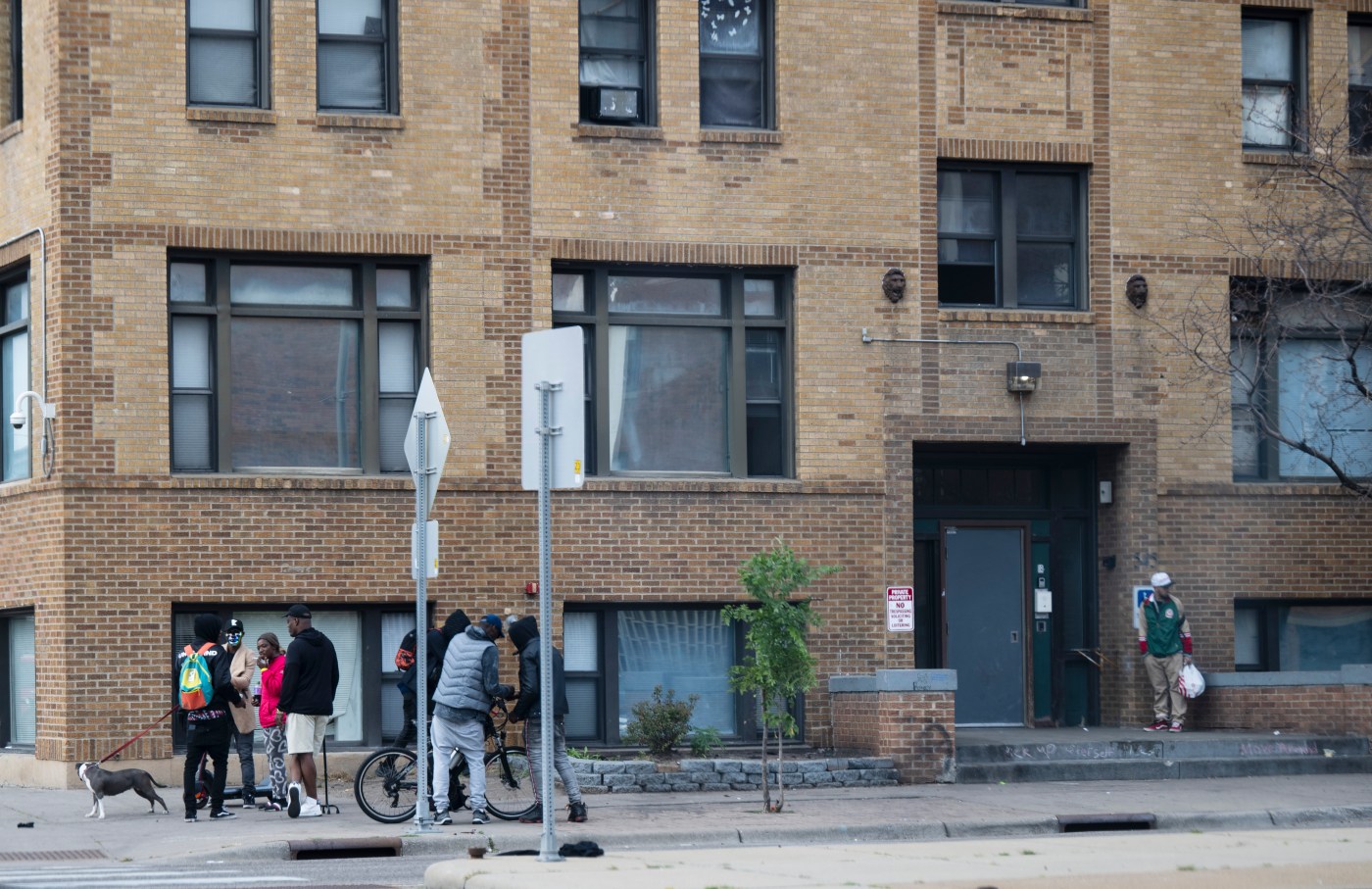
Planned expansion of Kimball Court housing for the recently homeless stirs hope, opposition
For decades, the four-story, brick-faced apartment building at Snelling and Charles avenues has housed many of the most difficult tenants to place, including the recently homeless. Then, in 2019, Beacon Interfaith took its housing strategy a step further at Kimball Court, prioritizing and providing treatment for residents with histories of chronic homelessness, complex barriers to housing and behavioral health challenges.
“People who are struggling with substance abuse, with addiction, with homelessness … the challenge is getting into a safe place to get stable,” said St. Paul City Council President Mitra Jalali, who represents the area. “That’s the ‘Housing First’ model. … We have gotten people out of camps and into housing at Kimball Court. We have gotten people stable enough to start looking at treatment options at Kimball Court.”
The execution hasn’t always been as well received by neighboring residents and property owners. In 2022, by its own admission, the Beacon Interfaith Housing Collaborative went through four security contractors and multiple property managers before settling on on-site staff that seemed to have a better handle on loitering, litter and other issues that have rattled the neighborhood.
Officials with Beacon Interfaith and Avivo, their on-site service provider, say the situation has improved. They’ve instituted guest check-ins, key fob entries, security walk-throughs, thrice-weekly outdoor litter pick-up and on-call after-hours maintenance for the dormitory-style building. At least three case managers, among other staff, are on site daily.
Next up is a major expansion.
On Wednesday, the St. Paul City Council met as the city’s Housing and Redevelopment Authority to review a public funding request related to the 76-unit “permanent and supportive” housing development at 545 Snelling Ave. N. Beacon Interfaith, a St. Paul-based nonprofit, hopes to complete a full rehab of the 1926 structure and also redevelop a neighboring vacant storefront to the north, tearing it down to replace it with 22 additional units.
The $19 million remodel and expansion also would make more room for management offices, service areas and common rooms, which Beacon Interfaith says will better serve clients and promote stability and oversight. Half of the 98 apartments would be dedicated to rapid rehousing for the recent “high-priority” homeless, and 15 would be reserved for the disabled.
Kevin Walker, vice president of housing development with Beacon Interfaith, told the city council on Wednesday that an improved layout “will better support and serve our residents and the surrounding community,” and the added units would help fund better security and staffing ratios.
About a dozen public funding sources support the expansion. Beacon Interfaith is counting on a $3.35 million, no-interest loan from the city’s COVID relief funds left over from the city’s allotment of the federal American Rescue Plan. The nonprofit also seeks an extension of the city’s existing $501,000 HOME loan, which dates to 2010.
Minnesota Housing Finance Agency housing infrastructure bonds, Ramsey County ARPA funds, county general obligation bonds, Metropolitan Council development grants, and client backing from the Red Lake Nation also are in the funding mix. New to the site, the St. Paul Public Housing Agency will award 24 project-based Section 8 housing vouchers in the new complex. Other units are backed by housing support services awarded through Ramsey County or the Red Lake Nation.
Is the Midway overloaded with needs?
In community meetings, some neighbors have questioned whether the expansion of deeply affordable housing for the recently homeless will add stability and more opportunity for social services and oversight, as promised, or further destabilize an area sometimes overloaded with needs. Business owners have complained of panhandling, open drug use and loitering nearby, especially around the vacant CVS store at the corner of Snelling and University avenues, as well as Metro Transit Green Line’s Snelling station.
Residents have noted the University Avenue corridor already is home to a substantial affordable housing, sober housing and related services. On Wednesday, the nonprofit Model Cities announced it would relocate the Safe Space emergency overnight shelter from a Ramsey County government building in downtown St. Paul to Central Baptist Church at 420 North Roy St. in the Midway.
With an eye toward quality-of-life issues, the Hamline-Midway Coalition has launched a “Stabilize Snelling and University” campaign and plans a community town hall at Hamline University’s Bush Ballroom on Hewitt Avenue on Oct. 17.
Early last month, a Midway resident who lives near Kimball Court said his construction tools had been stolen on three separate occasions in as many weeks. “I had all of my tools stolen and then was borrowing tools from work and those were stolen,” said Karl Solberg, adding that more attention needed to be brought to the “open-air drug use, theft and vandalism” in the area.
Solberg said he walked outside his home Thursday morning to find leftovers from a rotisserie chicken in its plastic case in his front boulevard, and “nasty clothes full of garbage spread all over.”
“There’s so much dumping that takes place at the CVS and around the area, from discarded needles to actual feces,” he added. “There’s a lot of people who support my opinion that compassion is good, but we still need to support the homeowners. We have elderly neighbors who are fed up. I want St. Paul to be a little more than what it seems to be at this intersection.”
Another neighborhood resident recalled seeing a man die in front of her in the alley behind Kimball Court about two years ago, the victim of an apparent drug overdose.
Jalali, the council president, has supported the proposed Kimball Court expansion.
“We need housing for people,” Jalali said in a recent interview. “When we don’t have that, or it’s not supportive, the issues spill out elsewhere. A lot of homeless services are concentrated in the downtown sector, and I think our city has a lot of work to do in offering supportive services throughout our neighborhoods. That’s everything from more day shelters to transitional housing. It’s not just ‘I was living outside and now I’m in an apartment.’ We need to be able to say in every neighborhood there’s resources for people.”
Building’s history, future
The Kimball Court building was constructed in 1926 as the Hamline Hotel, later renamed the Kimball Hotel. In 1947, the Black civil rights activist Bayard Rustin staged a sit-in until he was provided lodging. In the modern era, the Amherst H. Wilder Foundation ran Kimball Court as deeply affordable housing until it was acquired by Beacon Interfaith in 2010.
Avivo said most tenants stick around no more than two or three years before graduating to roomier accommodations. Most were recently homeless, spending anywhere from a year to a decade on the streets.
Among the planned building changes, an existing ingress will be repositioned as an egress, effectively flipping the site’s front and rear doors and offering a better line of sight from the front door to a new security desk. A community room will allow for resident townhalls, and additional space would allow for better coordination between property management and support services. The rehab of the existing structure will add a new roof and windows.
Officials have said adding units will make Kimball Court’s finances more sustainable, helping to pay for 24/7 security, including security cameras, a security guard and sometimes their supervisor. The three case managers on site daily will become four.
The vacant Star Market, which adjoins Kimball Court on Snelling Avenue, could be demolished by December. Construction would take 17 months, with the new addition opening in December 2025 and the rehab of the existing building completed by May 2026. Upon completion, the structure will host 24 efficiency units and 72 single-room occupancy units that share a kitchen.
Beacon Interfaith, an affordable housing developer and collaborative of 100 faith-based congregations, has developed, owned or operated 21 properties spanning more than 700 units, including the American House in Lowertown.
[related_articles location=”left” show_article_date=”false” article_type=”automatic-primary-tag”


